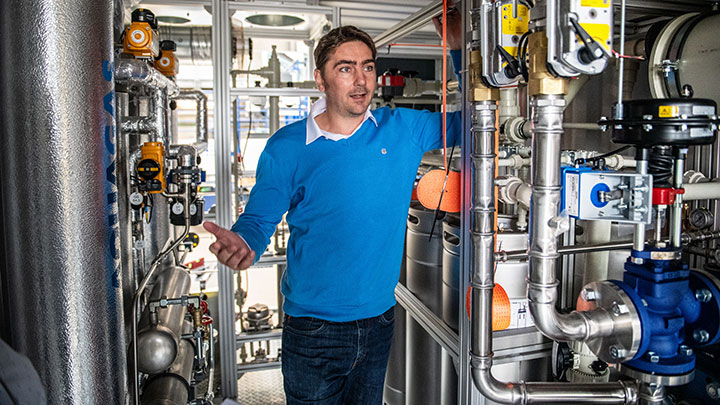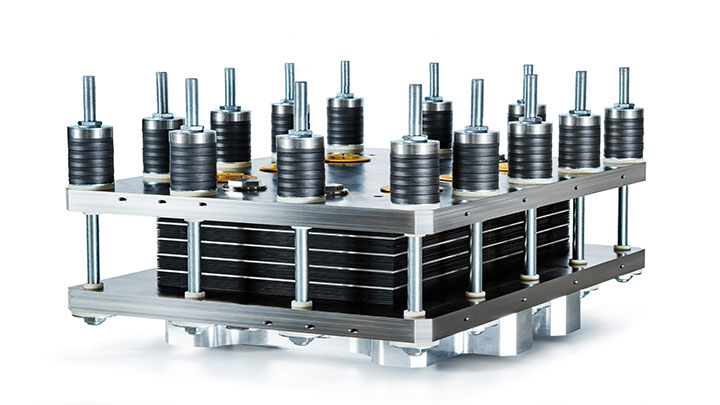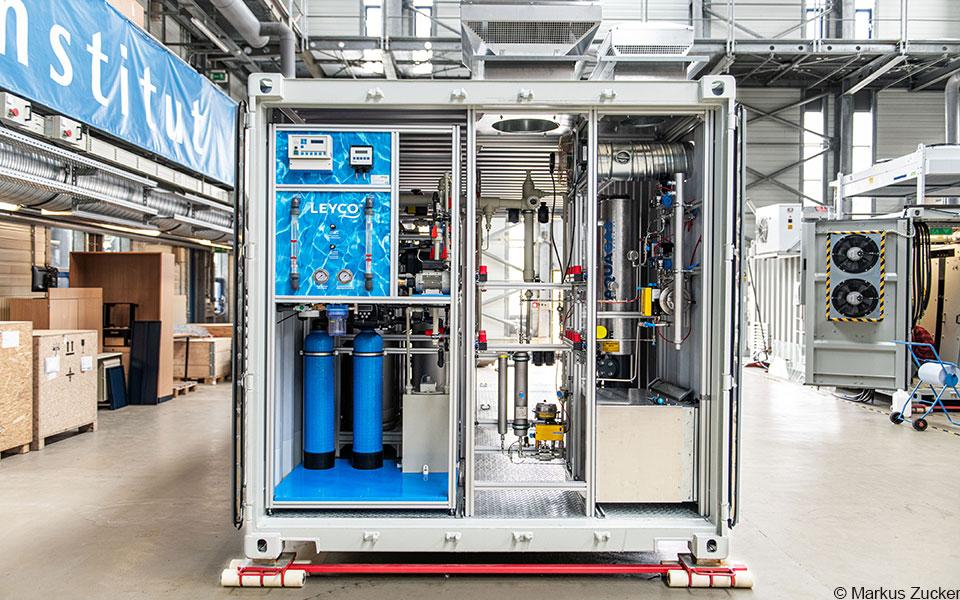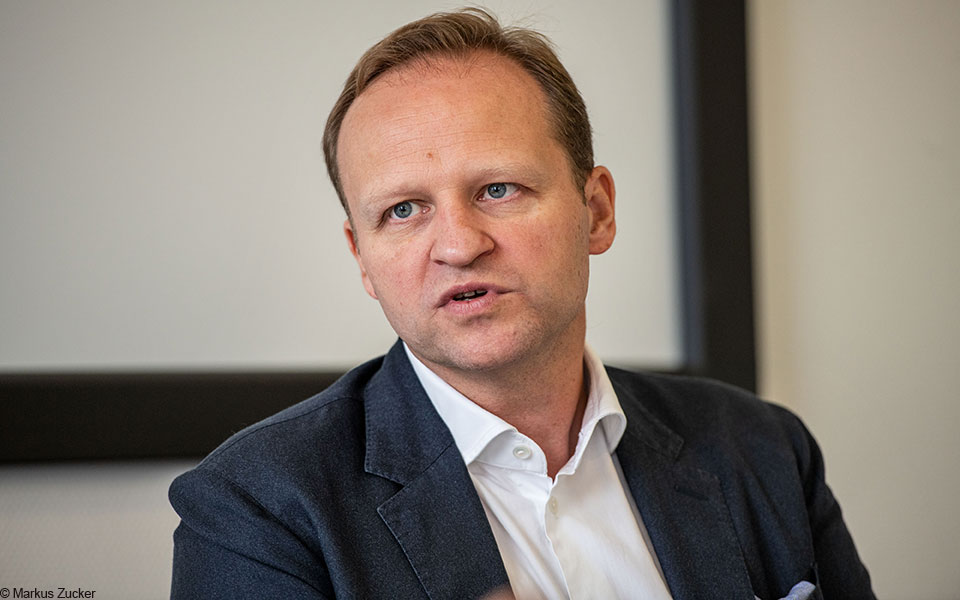Meet the research and production company that’s fighting climate change with hydrogen technology
For nearly 20 years one German company has been perfecting the technology to create a green hydrogen economy. Now, with MAN Energy Solutions as a new co-investor, the company is expanding production to help transmute their stacks and electrolyzers into a 100 percent renewable energy supply.
By Rhea Wessel

H-TEC Systems Managing Director Joachim Herrmann inside a flexible electrolyzer container solution for the production and storage of hydrogen from renewable energy.
Joachim Herrmann stands at the whiteboard explaining how hydrogen power can speed up the energy transition around the world. As he draws lines coupling sectors like mobility and heat to renewable energy, Herrmann describes a move to green hydrogen as a “no-brainer” and “a must.”
Herrmann is Managing Director of H-TEC SYSTEMS, a company helping to make the dream of a 100 percent renewable energy supply a reality. H-TEC is developing and expanding the production of electrolyzers needed to make green hydrogen, which can be used to create synthetic gas.
“By converting green energy to synthetic fuels,” Herrmann tells a group of visitors touring the electrolyzer assembly site in Augsburg, Germany, “renewable energy becomes storable and transportable – that’s essential for spreading the use of renewables to areas outside the power grids.”
“We have to transform the whole energy system”
According to a recent report by the International Energy Agency, green hydrogen is already enjoying “unprecedented political and business momentum, with the number of policies and projects around the world expanding rapidly.” The report concludes that now is the time to scale up technologies and bring down costs to allow hydrogen to become widely used, for instance, to decarbonize transportation, store energy, blend into fuels to reduce carbon for gas-fired power plants and existing natural gas networks, or as a clean input for industrial production.
This is what the management of H-TEC wants to see. “We have to transform the whole energy system,” says Herrmann, “and that means we need an industrial-scale production of hydrogen. That’s a major challenge.”

The stuff that dreams are made of: H-TEC’s electrolyzer stacks are paving the way for decentralized hydrogen production.

H-TEC’s electrolyzers work to provide carbon-free energy as a gap filler for the power grid and for heat supplies, material use and Power-to-X.
Tackling one of humanity’s most critical challenges
Moving through the assembly hall, Herrmann points to a stack inside a container that holds an H-TEC electrolyzer and explains how one of H-TEC’s customers in northern Germany will use it. “A wind farm will convert excess energy into hydrogen with this electrolyzer. The community near the farm will collect the hydrogen in pumps and then run fuel cell busses with the energy. It’s a win-win for the community and the wind farm. The community wants emission-free public transport, and the wind farm opens up new markets to sell its excess wind power by storing it as hydrogen.”
H-TEC’s majority owners, Heinrich Gaertner and Ove Petersen (founders of GP JOULE, the parent company of H-TEC), have spent much of the past decade talking about this type of use case, as they invested in the development of the company’s core technology, the electrolyzer stack. They also spent many of those years educating industry and policymakers about hydrogen power.
In 2010 Joachim Herrmann joined the company and became the driving force behind making the large-scale storage of renewable energy a reality. “We don’t have much time left to move to clean energy,” says Herrmann. “Our goal is to be the most economical and efficient developer and maker of stacks for the production of hydrogen. We want to be among the top three worldwide.”
Speeding up a hydrogen economy
Whereas Herrmann drives the development of hydrogen technology, Frank Zimmermann drives the business. It was Zimmermann who orchestrated the new partnership with MAN Energy Solutions, and while his background in mergers and acquisitions was not the “typical” pick for the top job at a small industrial company, the founders wanted him for his experience in financing and building companies. His work at the company has also had a profound effect on his attitude towards the future and energy. He now drives an electric car and is a passionate believer in the company’s mission: “As I learned more and more,” Zimmermann says, “I became convinced that hydrogen is the answer to move along the energy transition.”
Zimmermann first met Gaertner and Petersen during a trade fair, where they began discussing their dream of scaling up the production of electrolyzers. As Zimmermann continued discussions with H-TEC’s management and developers, they all began to see a serendipitous overlap of skills. Looking back, Zimmermann says Gaertner and Petersen had “an entrepreneurial inkling” from the beginning. “If you think through the energy transition, then you realize you need hydrogen to let decentralized green energy become a tangible asset. When they invested in H-TEC, they had an inkling of this idea but no clear business case yet. In 2017, the products were marketed at the Hanover fair for the first time.”

“If you think through the energy transition,” says H-TEC’s Managing Director Frank Zimmermann, “then you realize you need hydrogen to let decentralized green energy become a tangible asset.”
Now H-TEC is taking their business and production to a whole new level: In mid 2019, MAN Energy Solutions acquired 40 percent of H-TEC, with an option for a complete takeover. "We view this partnership with H-TEC SYSTEMS as a strategic step and as our entry into the hydrogen economy,” says Uwe Lauber, CEO at MAN Energy Solutions. Both parties are confident that H-TEC will play a big part in ushering in the hydrogen economy. H-TEC’s managing director Herrmann puts it succinctly: “Look, traditional sources of energy won’t be available anymore. If you want to be responsible for future generations, you have to produce hydrogen.” And H-TEC continues to forge ahead, helping companies and power providers to do just that: Already by 2022 the company together with MAN plans to unveil a ten-megawatt electrolyzer to boost the industrial application of hydrogen.
“If you want to be responsible for future generations, you have to produce hydrogen.”
About the author
Rhea Wessel is an American freelance writer who is based near Frankfurt, Germany. Her work has appeared in the Wall Street Journal and the New York Times.
Explore more topics
MAN Energy Solutions is now Everllence.
We have adopted a new brand name and moved to a new domain: www.everllence.com. This page will also be relocated there shortly. We are working on shifting all pages to www.everllence.com.
